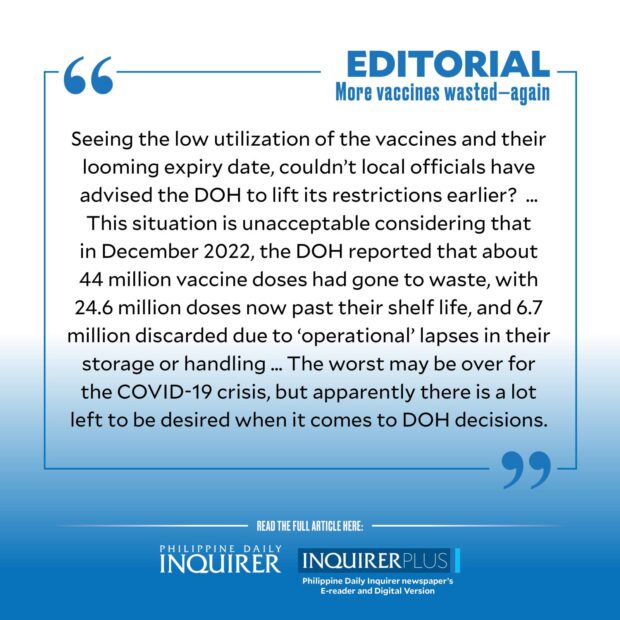More vaccines to be wasted anew
Last week, Department of Health (DOH) Secretary Teodoro Herbosa urged people to avail themselves of the bivalent vaccines donated by Lithuania in June before they expire on Aug. 31. The vaccines actually had an expiry date of July 31, but Herbosa said the manufacturer had extended its shelf life until end of this month.
The health official said the slow consumption of the COVID-19 bivalent vaccine prompted the agency to make it available to the general public instead of just the priority groups of health-care workers and senior citizens. Only 38 percent of the more than 390,000 donated doses of the vaccine were used as of July, Herbosa said. Those who had received their primary jabs with one booster shot can now avail themselves of this vaccine that specifically targets the fast-spreading BA.4 and BA.5 subvariants of the coronavirus’ Omicron variant, he added.
According to the DOH, the government’s vaccination target had been exceeded with more than 78.4 million people having been fully vaccinated as of March 20. Of this number, some 23.8 million have availed of the first booster shot while 4.4 million have not obtained the second booster.
The respectable figures must have lulled people into complacency, believing that they are now amply protected from the virus and no longer needed additional shots. The declining number of cases, and the recent lifting of the COVID-19 state of public health emergency might have added to this impression, and kept people away from vaccination sites. Misconceptions about the health risks of vaccines—a carryover of the hysteria raised by the Dengvaxia scare in 2018—could also have discouraged others from seeking immunization.
The misimpression of severe risk might have been bolstered as well by a Food and Drug Administration (FDA) announcement early July that a doctor’s prescription was required to purchase bivalent vaccines, as the agency warned people from administering the jabs themselves.
Before Herbosa’s appeal, most local government units (LGUs) have kept seniors at bay, allowing only health-care workers to avail of the vaccine. It was only toward the end of July that the notice on the vaccine’s availability for all started appearing on social media pages. And as if we never learned from previous wanton wastage of vaccines, the DOH is only now scrambling to have the bivalent shots administered before they expire.
Seeing the low utilization of the vaccines and their looming expiry date, couldn’t local officials have advised the DOH to lift its restrictions earlier? What’s the point of devolution when LGUs can’t exercise discretion within their jurisdiction on such urgent matters as health?
This situation is unacceptable considering that in December 2022, the DOH reported that about 44 million vaccine doses had gone to waste, with 24.6 million doses now past their shelf life, and 6.7 million discarded due to “operational” lapses in their storage or handling.
Although Then DOH officer in charge Maria Rosario Vergeire rationalized that the 17.5 percent wastage rate was well within the “acceptable level” set by the World Health Organization, which is between 25 percent and 30 percent, lawmakers estimated that taxpayers lost P15.6 billion in unused and discarded vaccines.
“It’s money the Philippines can’t afford to waste,” business leader Joey Concepcion said last year, noting that the wastage included vaccines purchased by big corporations for their employees, which the government was supposed to administer. Data released by the Bureau of the Treasury also showed the country’s outstanding debt breaching the P12-trillion mark for the first time in January 2022, due to the massive borrowing for pandemic response, including the purchase of vaccines.
Another point that needs looking into is the safety and potency of the vaccines whose expiration date was merely extended. Last year, the FDA also extended the shelf life of more than 12 million AstraZeneca, Sinovac, and Sputnik V doses that, Vergeire assured, underwent a “stability study” to verify their long-term quality. Still, such concerns have not helped any in addressing people’s trust issue regarding vaccines.
And now, despite tepid public response to the vaccine, we’ve learned that in June, the DOH was in talks with the COVAX facility for a possible delivery of two million doses of the same vaccines. What measures are being planned to ensure that huge public funds lost because of vaccine wastage won’t be repeated this time? How is the DOH addressing vaccine hesitancy and misinformation? Are there enough vaccine sites that are accessible even in remote areas? With frequent power interruptions even in big cities, how is proper storage of these heat-sensitive vaccines being managed? Just as importantly, can LGUs be given more autonomy and discretion when it comes to the health needs of their constituents?
The worst may be over for the COVID-19 crisis, but apparently there is a lot left to be desired when it comes to DOH decisions.





















